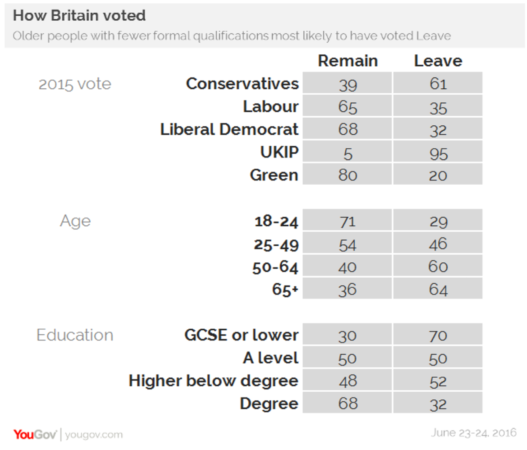Brexit, Millennials and Youth Travel
On the 23rd of June 2016, 52% of the British public voted to leave the European Union in a historic referendum. The consequences for the travel industry, both from a UK and an EU perspective, are only just beginning to become clear.
There are plenty of articles and even a few books detailing the story of the UK's decision to leave the European Union; countless opinions outlining the whys and the hows. But among all of the analysis is a fact that makes for painful reading for supporters of the European project: There was a huge split in the vote depending on age.
Official UK government statisticians YouGov released a number of telling figures that indicate the divide in British society. Most notable is the difference between the old and the young and their outlook on Europe:

Under-25s were more than twice as likely to vote Remain (71%) than Leave (29%). Over-65s voted in almost exactly the opposite way: 64% of over-65s voted to Leave while only 36% voted to Remain. Among the other age groups, voters aged 24 to 49 narrowly opted for Remain (54%) over leave (46%) while 60% of voters between the ages of 50 and 64 went for Leave.
At a very basic level, the result of the vote appears to be a case of young people, especially Millennials, not being heard. Older generations, particularly those over 65, (also those most likely to be long gone before the impact of the vote bears fruit) decided the outcome of the vote.

Brexit and Millennials
So what does this say about young people in Britain and how will it impact young people in the UK and around Europe?
For one thing, it suggests that the UK's young people are no different to those in their age group around the world: they are open-minded, outward-looking and lean towards integration rather than the closed door of nationalism.
One of the founding principles, or 'four freedoms' of the European Union is the freedom of movement: The ability to work, travel, live and love anywhere in the EU.
This translates well into the kind of trips becoming increasingly popular with globally-minded Millennials, such as working on the go, gap year travel, long-term tours, city breaks and immersive experiences.
As it stands, UK negotiations are still underway. Nobody yet knows what the new relationship - if any - will look like when the 'leaving' actually happens in 2019. That uncertainty is, in itself, something already having an impact on travel within the European Union. Last month figures showed that there had been a remarkable 96% drop in the number of EU nurses registering to work in the UK since the vote.
That figure suggests that for the foreseeable future Europeans don't feel particularly welcome in the United Kingdom - at least that's the case for those intending to live and work, rather than just tourists.
That distinction is an important one. Sure, overall tourism to the UK is a major part of the economy that isn't going anywhere soon. But travel among young people moving for long-term reasons like work and education could begin to drop off.

Survey suggests youth travel in the UK isn't growing as fast as it should
The Brexit fallout comes at the same time as a stark difference between youth travel in the UK and general tourism becomes clear.
According to the UK's Office of National Statistics, youth and student travellers coming to the UK contribute ?22.3bn to the country?s economy. For the sake of perspective, that's more than the top 20 football clubs combined or the total made from airline giant Ryanair.
That number didn't appear to dip as a result of the Brexit result. In fact it has grown at an average rate of 4.7% over the last five years. However, the sector is not growing at the same pace as the country?s overall tourism market, which grew 19% between April 2016 and April 2017.
So sure, youth travel to the UK is growing. But barely. And that's before the harsh realities of a UK outside of the European Union sets in. So far, the UK travel industry has benefited from a fall in the Pound that's made inbound travel cheaper for tourists.
But challenges are on the horizon. The British Educational Travel Association (BETA), recently surveyed 336 travel operators in the UK and their overseas partner organisations - in total around 1.5 million youth travellers were represented.
?We did an initial study five years ago which showed a value of ?20bn, so it?s gone up, but it?s not where it should be,? said Steve Lowy, chairman of BETA. ?There are still massive opportunities, it?s just not growing as quickly and policy could change in a very favourable way, very quickly in a very easy manner.?
One of the things that BETA suggested that would help to grow youth travel to the UK was a more friendly visa application process. But with Brexit on the horizon, it's more likely that application processes will grow more, not less, complex.
The report found that youth and student travellers represent 38% of all visitors to the UK. Currently Europe accounts for 77% of all youth travel to the UK, so clearly the Brexit decision and movement policy post-Brexit will have a huge impact on those numbers. In another irony, a third of staff at responding organisations were from the EU.
It's fair to assume that the weakened Pound is also going to have a reverse effect on UK holidaymakers. Trips abroad have become increasingly expensive as the economic reality of Brexit sets in, which is already having an impact on popular destinations such as Spain and France.
Millennials love to travel, but not the travel industry?
Let's take a look at the wider picture now. We've seen that Brexit is going to have an effect on the UK travel industry. We've also seen that it's going to have an impact on Millennials - perhaps one that goes against the beliefs of many members of that generation.
Those beliefs are our next focus. The travel industry has long been one of the most diverse employers of any developed sector. That fact is symptomatic of an industry based on integration and the sharing of cultural experiences. So why, according to panellists at a recent Institue of Travel & Tourism (ITT) conference, is the industry struggling to attract top young talent?
HR and training consultant Claire Steiner said there was a ?disconnect? between travel businesses and students when it came to recruiting. But how is it that such an inspiring industry is failing to attract young people?
She suggested that it might be because many travel operators don't have systems in place to recruit graduates. Although she also pointed out that there are more ways to go than just standard graduate schemes.
?There are a lot of companies which don?t see the opportunities to employ tourism students,? she told delegates. ?Give them work experience, give them projects while they?re doing their degrees.?
There's no doubt that young people want to work in the travel industry - it's just a question of engaging them at the right time. That's where operators have to be proactive, according to Steiner: "They just want to be engaged.?
It's also getting to the point, she said, where the industry will have to look beyond Millennials and focus on attracting Generation Z.
Why bother employing Millennials?
Travel startups and established operators would do well to realise that Millennials are not far from being the biggest spenders in the industry. With that in mind, having them as part of your team is an easy way to guarantee that you'll be marketing and speaking to them in the right manner.
Some in the industry are making moves already. One example is Movenpick Hotels & Resorts, who recently created a new advisory board run by millennials. That board will suggest ways to improve how it serves the younger demographic.
Craig Cochrane, senior vice-president of human resources at Movenpick Hotels & Resorts, said that it was a way of making the company future-proof. ?It?s something new for us and something we are very excited about. It?s not a PR stunt, it?s an open forum that we have gotten a lot out of and is giving us the pushback we need.?

Millennials in the travel industry - Some statistics
Management consultancy firm Boston Consulting Group has reported, perhaps unsurprisingly, that millennials are far more interested in travel than older generations - estimating a 23% rise in interest compared with previous generations.
A 2014 UN report suggested that Millennials make up about 20% of all international travelers. That figure is likely to be larger now, accounting for over 200 million global explorers.
Interestingly, surveys have shown that Millennials are the fastest-growing age segment when it comes to the amount of cash they?ll spend on travel. This is interesting given the context of student loans and reduced home ownership, and serves to underline the importance young people place on travel.
But it's not just expenditure where Millennials differ. It's travel behaviour as well...
A study by Phocuswright, a travel market research firm, gave some interesting statistics and insights:
- More than 70% of millennials took at least one leisure trip in 2013
- Many take four or five trips a year
- 66% of millennials think travel is an incredibly important part of their lives
- 71% of millennials took short jaunts of three nights or less
- Millennials are twice as likely as older travellers to take trips of 14 or more days
Conclusions
There are a few conclusions to be drawn from Millennials' interesting relationship with travel.
- Their passion for travel is being challenged (in the UK and the EU at least) by Brexit
- The industry isn't doing enough to bring them in from a proffessional perspective
- Having Millennials as part of your travel team gives you a greater chance of engaging with what is an increasingly influential market demographic
- Their global outlook remains undiminished